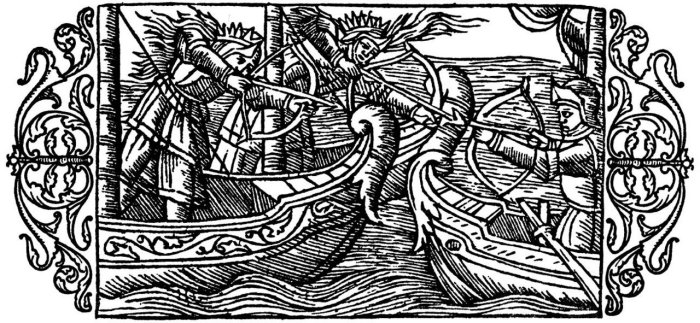Alwilda – Imprisoned Viking Princess Who Became A Pirate Queen
Ellen Lloyd - AncientPages.com - The story of Alwilda sounds more like a fairytale, and truth to be told; it's difficult to determine whether the account is based on historical events or is just a beautiful and romantic legend.
Left: Awilda as depicted in The Pirates Own Book, published in 1837. Credit: Public Domain - Right: Pirate ships. Credit: Public Domain
Alwilda was said to be the daughter of Synardus, a 5th-century Scandinavian king. According to some sources, Synardus was king of Gotland, Sweden.
Her father was overprotective and decided to lock his young and beautiful daughter in a tower. It was done to keep young men away from her. To make it extremely difficult to get near Alwilda, her father ordered dangerous snakes around the building. Admirers had to climb the tower and defeat the poisonous snakes that guarded her, but no one, except the Prince of Denmark, succeeded.
Prince Alf of Denmark asked the king if he could marry his daughter. King Synardus agreed and said he would arrange a marriage between Alwilda and the Prince Alf of Denmark.
However, Alwilda didn't like the idea of marrying an unknown prince.
When Prince Alf entered her room, he discovered Alwilda was gone. Her mother had helped her to escape. To avoid her impending marriage, Alwilda fled and joined her female friends. These young women dressed as men and were sailors. Together, Alwilda and her female pirates hijacked a ship. One day during their journeys, they encountered a ship that had lost its captain. Because of her skills, the pirates unanimously elected Alwilda as their captain. Dressed as a man, Alwilda became a successful and feared pirate, but it seems she could not escape her fate.
News about her piracy reached, and the King of Denmark sent his son and a navy ship to battle with the troublesome pirates.
On Viking Expeditions of Highborn Maids: Two female warriors, of the royal family, according to the crowns on their heads, are participating in a sea battle. From Olaus Magnus' A Description of the Northern Peoples from 1555. Credit: Public Domain
As Charles Ellms writes in The Pirates Own Book, "by this reinforcement, she became so formidable, that Prince Alf was dispatched to engage her. She sustained his attacks with great courage and talent. Still, during a severe action in the Gulf of Finland, Alf boarded her vessel and, having killed the greatest part of her crew, seized the captain, namely herself, whom nevertheless he knew not because she had a casque which covered her visage.
The prince was agreeably surprised, on removing the helmet, to recognize his beloved Alwilda, and it seems that his valor had now recommended him to the fair princess, for he persuaded her to accept his hand, married her on board, and then led her to partake of his wealth, and share his throne." 1
Other versions of the story inform that after Alwilda revealed her identity, she and the prince married on the ship's deck. Later, they went to the shore and reigned as king and queen of Denmark.
Whether Alwilda was a real historical person is challenging to determine due to the lack of credible ancient accounts. Most historians consider the story of Alwilda a legend. There may have been a Scandinavian princess who escaped from a tower and became a fierce pirate. After all, historians know today that there were female Viking warriors.
In Norse mythology, there are many stories about female warriors called shield-maidens.
Historians have debated whether these powerful women existed for years, and now we have the answer. Archaeologists have found evidence that female fighters might have roots in historical events.
It can be added that Alwilda's story seems to have been known in other European countries. 'Torquato Tasso, for example, an Italian poet of the 16th century, wrote a play named Il Re Torrismondo'. 2
In this tragedy the story of Alwilda is slightly different. She must marry Germondo, the king of Sweden, but she falls in love with Torrismondo. Not feeling she has any options, Alwilda commits suicide to not choose between love and honor.
Written by Ellen Lloyd – AncientPages.com
Updated on Nov 6, 2023
Copyright © AncientPages.com All rights reserved. This material may not be published, broadcast, rewritten or redistributed in whole or part without the express written permission of AncientPages.com
Expand for referencesMore From Ancient Pages
-
 Biblical Pool Of Siloam In The City of David To Be Excavated And Opened To The Public
Archaeology | Jan 2, 2023
Biblical Pool Of Siloam In The City of David To Be Excavated And Opened To The Public
Archaeology | Jan 2, 2023 -
 Cernunnos ‘Horned One’ – Powerful Continental God Preserved In Celtic Beliefs As Master Of Animals
Celtic Mythology | Dec 18, 2018
Cernunnos ‘Horned One’ – Powerful Continental God Preserved In Celtic Beliefs As Master Of Animals
Celtic Mythology | Dec 18, 2018 -
 Clay Tablets Reveal Sumerian Doctors Treated Disease With Spells Of Magic And Medicine
Archaeology | Feb 13, 2018
Clay Tablets Reveal Sumerian Doctors Treated Disease With Spells Of Magic And Medicine
Archaeology | Feb 13, 2018 -
 Will The Oven Bricks Of The Tudor Warship The Mary Rose Be Preserved Before It’s Too Late?
Artifacts | Apr 7, 2022
Will The Oven Bricks Of The Tudor Warship The Mary Rose Be Preserved Before It’s Too Late?
Artifacts | Apr 7, 2022 -
 Madagascar Hippos Were Forest Dwellers – New Study
Fossils | Jul 8, 2023
Madagascar Hippos Were Forest Dwellers – New Study
Fossils | Jul 8, 2023 -
 Burial Chamber Of Ankhesenamun, Tutankhamun’s Wife May Soon Be Found
Archaeology | Jan 22, 2018
Burial Chamber Of Ankhesenamun, Tutankhamun’s Wife May Soon Be Found
Archaeology | Jan 22, 2018 -
 Unique Female Viking Grave In Swedish Mountains Reveals Its Secrets
Archaeology | Jul 14, 2023
Unique Female Viking Grave In Swedish Mountains Reveals Its Secrets
Archaeology | Jul 14, 2023 -
 Evidence Supporting Drumelzier Legend And Merlin’s Death In Scotland Uncovered By Archaeologists
Archaeology | Sep 4, 2024
Evidence Supporting Drumelzier Legend And Merlin’s Death In Scotland Uncovered By Archaeologists
Archaeology | Sep 4, 2024 -
 Acheulian Culture Of Ethiopian Highlands And Their Prehistoric Tool Selection To Make Society’s Life Easier
Archaeology | Jan 10, 2025
Acheulian Culture Of Ethiopian Highlands And Their Prehistoric Tool Selection To Make Society’s Life Easier
Archaeology | Jan 10, 2025 -
 Little People: Ancient Race That Pre-Dates Native Americans, Celts, And Other Settlers Worldwide
Featured Stories | Aug 29, 2024
Little People: Ancient Race That Pre-Dates Native Americans, Celts, And Other Settlers Worldwide
Featured Stories | Aug 29, 2024 -
 ‘Blue Highways’ Helped Middle Stone Age Humans Who Survived The Toba Supereruption 74,000 Years Ago
Evolution | Mar 26, 2024
‘Blue Highways’ Helped Middle Stone Age Humans Who Survived The Toba Supereruption 74,000 Years Ago
Evolution | Mar 26, 2024 -
 On This Day In History: Johannes Kepler ‘Father Of Modern Astronomy’ Was Born – On Dec 27, 1571
News | Dec 27, 2016
On This Day In History: Johannes Kepler ‘Father Of Modern Astronomy’ Was Born – On Dec 27, 1571
News | Dec 27, 2016 -
 Ancient People In Chaco Canyon Who Had Six Fingers And Six Toes Were Special – Researchers Say
Archaeology | Mar 16, 2022
Ancient People In Chaco Canyon Who Had Six Fingers And Six Toes Were Special – Researchers Say
Archaeology | Mar 16, 2022 -
 Stunning Images Of Shackleton’s Lost Ship Endurance Discovered Off The Coast Of Antarctica
Archaeology | Mar 9, 2022
Stunning Images Of Shackleton’s Lost Ship Endurance Discovered Off The Coast Of Antarctica
Archaeology | Mar 9, 2022 -
 Paris Point Zero And The Mysterious Statue Of Monsieur Legris
Featured Stories | Dec 4, 2018
Paris Point Zero And The Mysterious Statue Of Monsieur Legris
Featured Stories | Dec 4, 2018 -
 Treasure Trove Of Assyrian Kings Found In Tunnels Excavated And Plundered By Terrorists
Archaeology | Apr 20, 2020
Treasure Trove Of Assyrian Kings Found In Tunnels Excavated And Plundered By Terrorists
Archaeology | Apr 20, 2020 -
 On This Day In History: Mary Queen Of Scots Born – On December 8, 1542
News | Dec 8, 2016
On This Day In History: Mary Queen Of Scots Born – On December 8, 1542
News | Dec 8, 2016 -
 Does This Ancient Box Contain Buddha’s Cremated Remains?
Archaeology | Nov 15, 2017
Does This Ancient Box Contain Buddha’s Cremated Remains?
Archaeology | Nov 15, 2017 -
 Secrets Of The Serpent Kingdom Revealed On Maya ‘Game Of Thrones’ Altar
Archaeology | Sep 15, 2018
Secrets Of The Serpent Kingdom Revealed On Maya ‘Game Of Thrones’ Altar
Archaeology | Sep 15, 2018 -
 Secrets Of The Two Half Crescent Moons And The Serpent People
Featured Stories | Jan 23, 2020
Secrets Of The Two Half Crescent Moons And The Serpent People
Featured Stories | Jan 23, 2020


